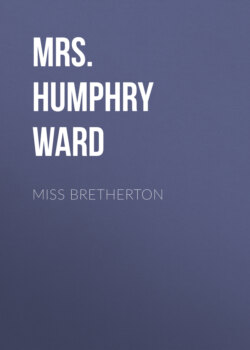Читать книгу Miss Bretherton - Mrs. Humphry Ward - Страница 3
На сайте Литреса книга снята с продажи.
PREFACE TO THE SECOND EDITION
ОглавлениеTable of Contents
So many criticisms, not of a literary but of a personal kind, have been made on this little book since its appearance, that I may perhaps be allowed a few words of answer to them in the shape of a short preface to this new edition. It has been supposed that because the book describes a London world, which is a central and conspicuous world with interests and activities of a public and prominent kind, therefore all the characters in it are drawn from real persons who may be identified if the seeker is only clever enough. This charge of portraiture is constantly brought against the novelist, and it is always a difficult one to meet; but one may begin by pointing out that, in general, it implies a radical misconception of the story-teller's methods of procedure. An idea, a situation, is suggested to him by real life, he takes traits and peculiarities from this or that person whom he has known or seen, but this is all. When he comes to write—unless, of course, it is a case of malice and bad faith—the mere necessities of an imaginative effort oblige him to cut himself adrift from reality. His characters become to him the creatures of a dream, as vivid often as his waking life, but still a dream. And the only portraits he is drawing are portraits of phantoms, of which the germs were present in reality, but to which he himself has given voice, garb, and action.
So the present little sketch was suggested by real life; the first hint for it was taken from one of the lines of criticism—not that of the author—adopted towards the earliest performances of an actress who, coming among us as a stranger a year and a half ago, has won the respect and admiration of us all. The share in dramatic success which, in this country at any rate, belongs to physical gift and personal charm; the effect of the public sensitiveness to both, upon the artist and upon art; the difference between French and English dramatic ideals; these were the various thoughts suggested by the dramatic interests of the time. They were not new, they had been brought into prominence on more than one occasion during the last few years, and, in a general sense, they are common to the whole history of dramatic art. In dealing with them the problem of the story-teller was twofold—on the one hand, to describe the public in its two divisions of those who know or think they know, and those whose only wish is to feel and to enjoy; and on the other hand, to draw such an artist as should embody at once all the weakness and all the strength involved in the general situation. To do this, it was necessary to exaggerate and emphasise all the criticisms that had ever been brought against beauty in high dramatic place, while, at the same time, charm and loveliness were inseparable from the main conception. And further, it was sought to show that, although the English susceptibility to physical charm—susceptibility greater here, in matters of art, than it is in France—may have, and often does have, a hindering effect upon the artist, still, there are other influences in a great society which are constantly tending to neutralise this effect; in other words, that even in England an actress may win her way by youth and beauty, and still achieve by labour and desert another and a greater fame.
These were the ideas on which this little sketch was based, and in working them out the writer has not been conscious of any portraiture of individuals. Whatever attractiveness she may have succeeded in giving to her heroine is no doubt the shadow, so to speak, of a real influence so strong that no one writing of the English stage at the present moment can easily escape it; but otherwise everything is fanciful, the outcome, and indeed, too much the outcome, of certain critical ideas. And in the details of the story there has been no chronicling of persons; all the minor and subsidiary figures are imaginary, devised so as to illustrate to the best of the writer's ability the various influences which are continually brought to bear upon the artist in the London of to-day. There are traits and reminiscences of actual experience in the book—what story was ever without them? But no living person has been drawn, and no living person has any just reason to think himself or herself aggrieved by any sentence which it contains.
